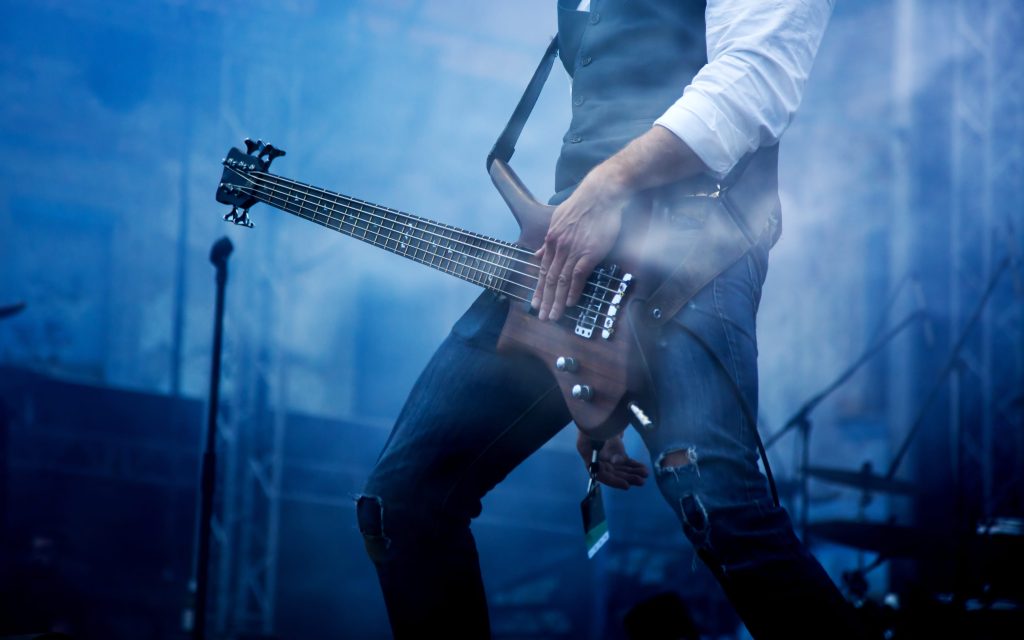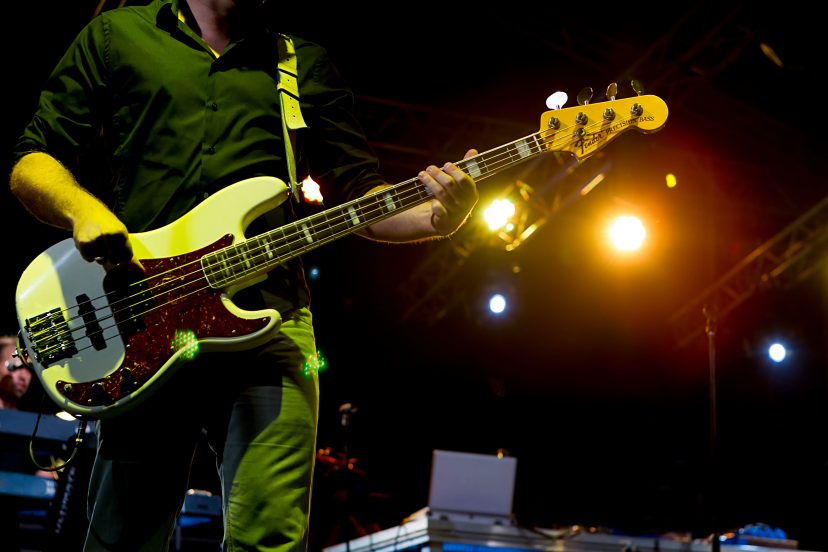Overcoming Stage Fright as a Bassist
Overcoming Stage Fright as a Bassist can mean defeating that familiar tightness in your chest, the sweaty palms, the fear of forgetting that crucial bassline – we’ve all been there. But stage fright doesn’t have to be your permanent bandmate. Let’s take a look at some practical strategies to help you conquer those pre-show jitters and rock the stage with confidence.
Understanding the Beast: What’s Really Going On?
First things first, let’s break down what’s actually happening when stage fright hits. That rush of adrenaline, the racing heartbeat – it’s all part of your body’s ancient “fight or flight” response. Back in the day, this helped our ancestors survive saber-toothed tiger attacks.
Now, it kicks in when we’re about to lay down some funky bass lines. Go figure. Here’s what’s interesting: this response can actually enhance your performance if you know how to harness it. That extra energy can translate into more dynamic playing, better stage presence, and a more engaging show overall.
The key is learning to reframe your anxiety as excitement. When you feel those butterflies in your stomach, remind yourself that your body is gearing up to help you perform at your best. It’s not trying to sabotage you – it’s preparing you for action. By shifting your perspective, you can start to see these physical sensations as a sign that you’re ready to rock, not a warning that you’re about to fail.
Overcome Stage Fright Help on Amazon
Preparation: Your Secret Weapon
One of the most effective ways to combat stage fright is thorough preparation. I’m not just talking about knowing your parts – though that’s crucial. I mean a holistic approach to getting ready for showtime.
Start by mastering your material inside and out. Practice until those basslines are as natural as breathing. Use a metronome to ensure your timing is rock-solid. Work on your parts both in isolation and with backing tracks to simulate the full band sound.
Next, simulate performance conditions during rehearsals. Wear your stage clothes, use your live setup, and even invite a small audience if possible. The more familiar you are with the performance environment, the less threatening it will feel when you’re actually on stage.
Here’s a pro tip that’s worked wonders for me: record your rehearsals and analyze them. This serves two purposes.
First, it helps you improve your playing by identifying areas that need work.
Second, it gets you used to the idea of being “on record” during a performance, reducing the pressure you feel when it’s time for the real thing.
Don’t forget about your gear. Make sure your bass is properly set up, your strings are fresh, and you have spare batteries for your active pickups. Having confidence in your equipment eliminates one more potential source of worry.
Lastly, develop a pre-show routine. This could include warming up your fingers, doing some light stretches, or running through a few key passages from your set. Having a familiar routine helps create a sense of normalcy and control, even in unfamiliar venues.
Mental Game: Rewiring Your Brain
Now, let’s talk about the mental side of things. Your mind is a powerful tool, and with some training, you can make it work for you instead of against you.
Visualization is a game-changer. Spend time each day imagining yourself on stage, feeling confident, nailing those basslines, and connecting with the audience.
The more vivid and detailed these mental rehearsals are, the more effective they’ll be. Use all your senses – hear the crowd, feel the vibration of your strings, see the lights on stage.
Positive self-talk is another crucial technique. Replace those negative thoughts (“What if I mess up?”) with affirming statements (“I’ve practiced hard, and I’m ready to rock”).
It might feel cheesy at first, but stick with it – your subconscious is listening. Over time, these positive affirmations will become your default mindset.
Mindfulness meditation can also be incredibly helpful. By practicing being present in the moment, you’ll be better equipped to stay focused during your performance as opposed to getting caught up in anxiety about what might go wrong.
Another powerful mental technique is reframing. Instead of thinking of your performance as a test or judgment, view it as an opportunity to share your passion for music with others. This shift in perspective can take a lot of the pressure off and allow you to enjoy the experience more fully.
Overcoming the Anxiety on Amazon
Physical Strategies: Calming the Storm
Your body and mind are interconnected, so addressing the physical symptoms of stage fright can have a profound impact on your mental state.
Breathing exercises are your first line of defense. Try this: Inhale deeply for a count of four, hold for four, then exhale for four. Repeat this cycle a few times before going on stage.
It’s simple, but incredibly effective at calming your nerves. This technique, known as box breathing, is used by everyone from Navy SEALs to professional athletes to manage stress in high-pressure situations.
Progressive muscle relaxation is another powerful technique. Start at your toes and work your way up, tensing and then relaxing each muscle group.
This reduces physical tension and gives your mind something to focus on besides anxiety. You can do this in the green room before a show or even sitting in your car before you head into the venue.
Regular exercise can also help manage stage fright in the long term. Physical activity releases endorphins, which can improve your mood and reduce anxiety. Plus, being in good physical shape will give you more stamina for those high-energy performances.
Don’t underestimate the power of a good diet, either. Avoid caffeine and sugar before a show, as these can exacerbate anxiety symptoms. Instead, opt for foods rich in complex carbohydrates and omega-3 fatty acids, which have been shown to have a calming effect on the body.
On-Stage Techniques: Riding the Wave
Once you’re actually on stage, there are several strategies you can use to keep stage fright at bay. Focus on the music, not the audience. Immerse yourself in the groove and the interplay with your bandmates. This helps you stay present and enhances your performance.
Remember, you’re there to make music, not to be judged. Establish a focal point. Find a spot on the back wall to focus on when you feel overwhelmed by the crowd.
This can help you feel more grounded and less exposed. You can also use this technique to connect with audience members – make brief eye contact with people throughout the crowd to create a sense of connection without feeling overwhelmed. Use controlled movement. A little stage movement can help release tension and connect you with the audience. Plus, it looks cool.
Start small – maybe just tapping your foot or nodding your head to the beat. As you get more comfortable, you can incorporate more movement into your performance.
If you make a mistake, don’t dwell on it. The audience probably didn’t even notice, and even if they did, they’ll forget about it quickly if you keep playing with confidence. Remember, this involves the overall performance, not any single moment.
Building Experience: Exposure Therapy in Action
One of the most effective ways to overcome stage fright is through gradual exposure. Start small – maybe an open mic night or a jam session with friends.
As you become more comfortable, work your way up to bigger gigs. Remember, every performance is an opportunity to grow. Even if things don’t go perfectly, you’re building resilience and experience with each show.
Keep a performance journal to track your progress and reflect on what you’ve learned from each gig. Consider joining a local music community or taking group lessons. Playing with others in a low-pressure environment can help build your confidence and give you more opportunities to practice performing in front of others.
Embracing Imperfection: The Secret to True Confidence
Here’s a truth bomb: perfection is overrated. Even the most legendary bassists have off nights or hit wrong notes. The difference is, they don’t let it derail their entire performance.
Learning to embrace imperfection can paradoxically lead to better performances. When you’re not paralyzed by the fear of making mistakes, you’re free to take risks, express yourself, and truly connect with the music.
Remember, your audience isn’t there to judge you – they’re there to enjoy the music. Most people won’t even notice small mistakes, and even if they do, they’re likely to forget them quickly if the overall performance is engaging.
Try intentionally making small mistakes during practice sessions and learning to recover smoothly. This will help build your confidence in handling unexpected situations during live performances.
The Power of Community
Don’t underestimate the value of connecting with other musicians who’ve been through the same struggles. Join online forums, attend workshops, or simply chat with your bandmates about performance anxiety.
Sharing experiences and strategies can provide invaluable support and insights. You might learn new techniques, gain perspective on your own challenges, or simply find comfort in knowing you’re not alone in your struggles.
Consider finding a mentor – an experienced bassist who can offer guidance and support. Their experience and perspective can be incredibly valuable as you work to overcome your stage fright.
Exercises to Build Your Stage Confidence
The Mirror Challenge
Practice your basslines while maintaining eye contact with yourself in a mirror. This helps you get comfortable with being watched while playing. Start with short sessions and gradually increase the duration as you become more comfortable.
The Distraction Game
Have friends create distractions while you practice (talking, moving around, etc.). This builds your ability to stay focused in chaotic environments. Start with mild distractions and gradually increase the intensity as you improve.
The Improv Adventure
Dedicate time to pure improvisation. This builds your confidence in handling unexpected situations on stage. Start with simple backing tracks and gradually move to more complex ones. Don’t worry about making mistakes – the goal is to stay in the moment and keep playing no matter what.
The Recorded Run-Through
Do a full set run-through while recording yourself. Listen back and focus on the positives – you’re probably better than you think! Make notes on areas for improvement, and be sure to thank what you did well.
The Micro-Performance
Set up a small performance for friends or family. This gives you a low-stakes environment to practice your stage presence. Ask for constructive feedback afterwards, focusing on both your playing and your overall performance.

Advanced Techniques for Seasoned Performers
Even if you’ve been performing for years, there’s always room for improvement when it comes to managing stage fright. Here are some advanced techniques to take your performance to the next level:
Flow State Induction
Learn to induce a flow state – that magical mental space where you’re fully immersed in the music and everything seems to come efficiently. This can be achieved through a combination of deep focus, clear goals, and a balance between your skills and the challenge at hand.
To practice this, try setting up practice sessions where you gradually increase the difficulty of what you’re playing. Start with something well within your comfort zone and slowly ramp up the complexity.
Pay attention to the point where you feel challenged but not overwhelmed – that’s the sweet spot for inducing flow.
Cognitive Restructuring
Work on identifying and challenging the specific thoughts that contribute to your stage fright. For example, if you often think “I’m going to mess up and everyone will laugh at me,” challenge this thought by asking yourself:
- What evidence do I have that this will happen?
- What’s more likely to happen?
- How many times have I performed without being laughed at?
By systematically challenging these negative thoughts, you can gradually replace them with more realistic and positive ones.
Biofeedback Training
Consider using biofeedback devices to gain more control over your physiological responses to stress. These devices can measure things like heart rate variability and skin conductance, giving you real-time feedback on your stress levels.
With practice, you can learn to control these physiological responses, effectively “hacking” your nervous system to stay calm under pressure.
Persona Development
Create a stage persona – a slightly amplified version of yourself that you can step into when you perform. I’m not talking about being fake, but rather about emphasizing certain aspects of your personality that lend themselves well to performance.
Think about the qualities you admire in your favorite performers. How can you incorporate some of those qualities into your own stage presence?
Practice embodying this persona during your rehearsals so it feels natural when you’re on stage.
The Role of Nutrition and Lifestyle
While we’ve touched on the importance of diet briefly, it’s worth diving deeper into how your overall lifestyle can impact your ability to manage stage fright.
Nutrition for Performance
Certain foods can help support a calm and focused state of mind:
- Omega-3 fatty acids: Found in fish, flaxseeds, and walnuts, these can help reduce anxiety.
- Complex carbohydrates: Whole grains, fruits, and vegetables can help stabilize blood sugar and mood.
- Magnesium-rich foods: Leafy greens, nuts, and seeds can promote relaxation.
On the day of a performance, aim for a balanced meal that includes protein, complex carbs, and healthy fats. Avoid heavy, greasy foods that might make you feel sluggish.
Hydration
Staying well-hydrated is crucial for both your physical and mental performance. Even mild dehydration can increase feelings of anxiety and fatigue.
Make sure you’re drinking plenty of water throughout the day, especially in the hours leading up to your performance.
Sleep
Never underestimate the power of a good night’s sleep. Chronic sleep deprivation can exacerbate anxiety and make it harder to cope with stress.
Aim for 7-9 hours of quality sleep each night, and try to maintain a consistent sleep schedule even when you’re not performing.
Exercise
Regular exercise can be a powerful tool for managing anxiety. It releases endorphins, improves mood, and can help you feel more confident in your body.
Find a form of exercise you enjoy and make it a regular part of your routine. Regular use can help you develop a calmer, more focused mindset.
Overcoming the Anxiety on Amazon
Virtual Reality Practice
Some musicians are using VR technology to simulate performance environments. This can be an effective way to practice performing “in front of an audience” without the real-world pressure.
Performance Analysis Software
There are apps and software programs that can analyze your playing, helping you identify areas for improvement. Some even use AI to provide personalized feedback and practice suggestions.
Backing Track Apps
Apps that provide customizable backing tracks can be great for practicing your parts in a simulated band context. Many allow you to adjust tempo, mix levels, and even the complexity of the accompaniment.
The Importance of Self-Care
Managing stage fright is not about what you do on stage or in the practice room. It’s also about how you take care of yourself overall.
Here are some self-care strategies that can make a big difference:
Mindfulness Practices
Incorporating mindfulness into your daily routine can help you stay grounded and present, both on and off stage. This could be as simple as taking a few minutes each day to focus on your breath or practicing mindful eating.
Journaling
Keeping a performance journal can help you track your progress, identify patterns in your anxiety, and celebrate your successes. After each performance, take some time to reflect on what went well and what you’d like to improve.
Hobbies Outside of Music
While music might be your passion, having interests and hobbies outside of your musical career can help reduce performance pressure. When music isn’t your entire identity, a single performance feels less make-or-break.
Professional Support
If stage fright is significantly impacting your life and career, don’t hesitate to seek professional help. A therapist, particularly one who specializes in performance anxiety, can provide valuable strategies and support.
Embracing the Journey
Remember, overcoming stage fright is a process, not a destination. Even the most seasoned performers still feel nervous sometimes. The goal isn’t to eliminate anxiety completely, but to develop a healthy relationship with it.
Celebrate your progress, no matter how small. Every time you push through your fear and perform, you’re building resilience and confidence. Each performance is a step forward on your musical journey.
Key Takeaways
- Stage fright is a natural response that can be harnessed to enhance your performance.
- Thorough preparation is your foundation for confidence.
- Mental techniques like visualization and positive self-talk can rewire your brain for success.
- Physical strategies help manage the bodily symptoms of anxiety.
- On-stage techniques keep you focused and grounded during the performance.
- Gradual exposure builds confidence over time.
- Embracing imperfection frees you to perform at your best.
- Community support provides valuable insights and encouragement.
- Regular practice of confidence-building exercises speeds up your progress.
- Nutrition, sleep, and overall lifestyle play a crucial role in managing performance anxiety.
- Technology can be a valuable tool in your stage fright management toolkit.
- Self-care is essential for long-term success in managing performance anxiety.
Frequently Asked Questions
How long does it take to overcome stage fright?
Overcoming stage fright is a gradual process that varies for each person. With consistent practice and application of coping strategies, many musicians see significant improvement within a few months to a year.
However, it’s important to remember that even experienced performers may still feel some nervousness before shows.
Is it normal to feel stage fright even after years of performing?
Yes, it’s completely normal to experience some level of stage fright even after years of performing. Many professional musicians report feeling nervous before shows throughout their careers. The key is learning to manage these feelings and use them to enhance your performance as opposed to hinder it.
How can I stop my hands from shaking when I play bass?
Shaking hands are a common symptom of stage fright. Some strategies to manage this include:
- Practice deep breathing exercises before and during your performance
- Use progressive muscle relaxation techniques
- Ensure you’re well-hydrated
- Avoid caffeine before performing
- Practice playing in stressful situations to build tolerance
What should I eat before a performance to calm my nerves?
Foods that can help calm nerves before a performance include:
- Bananas (rich in potassium and B vitamins)
- Whole grain bread or pasta (complex carbohydrates for sustained energy)
- Nuts or seeds (contain calming magnesium)
- Herbal tea (like chamomile or peppermint)
Avoid heavy, greasy foods and limit caffeine and sugar intake.
How can I improve my stage presence as a bassist?
Improving stage presence takes practice. Some tips include:
- Make eye contact with audience members
- Move to the music (even small movements can make a big difference)
- Interact with your bandmates
- Practice your performance in front of a mirror
- Watch videos of bassists you admire and incorporate elements of their stage presence into your own style
What if I forget a part during a performance?
If you forget a part during a performance:
- Stay calm and keep playing
- Simplify if necessary (play root notes if you can’t remember the exact line)
- Listen to your bandmates and try to get back on track
- Remember that most audience members won’t notice small mistakes if you recover quickly and confidently
How can I practice performing without an audience?
You can simulate performance conditions without an audience by:
- Recording yourself and watching the playback
- Using a mirror to watch yourself as you play
- Playing along with backing tracks at performance volume
- Wearing your stage clothes during practice
- Setting up your practice space to mimic a stage layout
Is it better to look at the audience or focus on my instrument?
A balance between the two is usually best. Make eye contact with audience members to connect with them, but don’t be afraid to look at your instrument when needed, especially during complex parts. The key is to appear engaged and confident, whether you’re looking at the audience or your bass.
How can I calm my nerves right before going on stage?
Some quick techniques to calm nerves right before going on stage include:
- Taking slow, deep breaths
- Doing a quick progressive muscle relaxation exercise
- Using positive self-talk or affirmations
- Listening to calming music
- Doing light stretches or shaking out tension in your body
- Visualizing a successful performance




